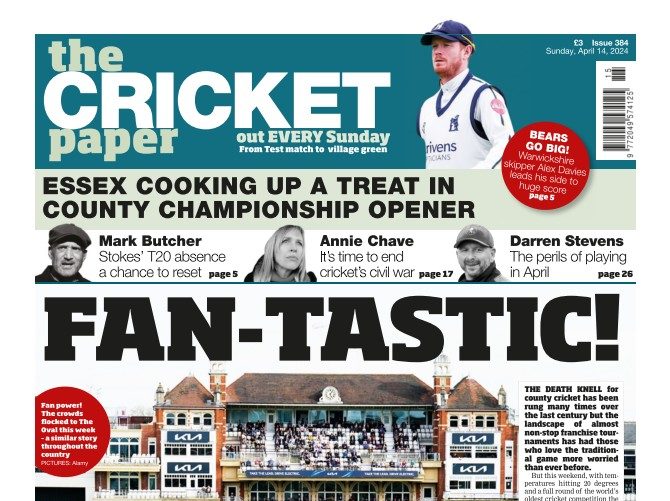Cricketers don’t get much designated in their honour outside the grounds they played upon, so it is gratifying to see Baildon Town Council name a thoroughfare after one of the great characters of English cricket – Brian Close.
Close, who passed away in 2015 at the age of 84, had a long and colourful career that stretched across five decades playing, as he did, for England, Yorkshire and Somerset.
The new street, in Baildon, a few miles north of Bradford, is called ‘Brian Close Walk’ and was opened by his widow Vivien on Friday – an apposite moniker for a man who played hard, but fair.
Fame came early for ‘Closey’ – as he was more widely known –
when he was picked to play Test cricket against New Zealand in 1949 at the age
of 18 years and 149 days – still the youngest to do so for England. It was not, though, the harbinger for a long
and distinguished Test career; the next 27 years seeing him play just 22 Tests,
the last of them at the grand old age of 45.
It was his last three Tests – all of them against the West
Indies in that long, hot summer of 1976 – for which he is best remembered, by
the public at least. Without cap or helmet, he took the mother of all physical
batterings at Old Trafford from Michael Holding then, along with Jeff Thomson,
the fastest bowler in world cricket.
Rather than risk getting out by trying to play the rising ball, Close allowed the many 90mph
bouncers Holding sent down to strike his body. Not once or twice, but for as
long as it took to see England through to the end of play on the third day,
which was just over an hour.
The pictures of his bruised ribcage made most of the
newspapers and turned Close into a folk hero in the process. Already well
established as one of the great characters of the county game, the battering
highlighted his bravery, something which had a big effect on two young
cricketers under his aegis at Somerset, Ian Botham and Viv Richards. Like their
county captain, both became well known for never taking a backward step on a cricket
field.
Having been first picked for England before the first Formula One Grand Prix (held at Silverstone in 1950), 1976 was the first year since his debut that Close had not inked the Test dates into his diary.
But if his usual positivity had deserted him, he was defiant when dropped after the third Test, telling colleagues that it was understandable. After all, he pointed out, ‘Greigy’ (Tony Greig) was under pressure as England captain so it was obvious that he should want his nearest rival for the job (in Closey’s mind Closey) out of the way.

A naturally gifted cricketer who batted left-handed, bowled right-arm off-spin and who liked to field close to the bat, Closey was probably better known in the end for his aphorisms and party tricks than his cricket.
Yorkshire might have won four County Championships under his captaincy but any tactical genius on his part has not lodged in the memory with the same certainty as his more barmy moments – such as the time he kept wicket without gloves.
For the senior pros of my generation at Essex, players like
Ray East and John Lever, Closey was a fund of great stories and sayings. East,
who toured with Close for the Derek Robbins XI back in the 70s, was
particularly smitten by his mix of bravado and badinage.
“I remember on that trip Closey being given out lbw, a decision that looked plumb from where we sat,” said East. “But Closey was never out as a batsman so to appease him I got a pot of tea ready and lit a fag for him, two things that tended to keep him calm.
“I also opened the window next to where he was changing,
just in case he decided to throw his bat through it.
But he came in and laid his bat down calmly before
demonstrating, with his thumb and forefinger, how he couldn’t have been out
because he was a fraction of an inch outside the line.
“Anyway, that night we were at a reception held in our
honour when an attractive woman arrived. ‘Captain’s prerogative to have the
first dance,’ says Closey, who promptly whisks her on to the dance floor where
he starts to whisper something into her ear.
“Well, this goes on and on so one of the lads gets up to dance next to them to see if he can
hear what is being said. Those expecting sweet nothings are disappointed.
Instead, Closey is defending his honour saying to her – ‘I tell you, I was that
much outside the line’.”
That sense of Yorkshire indomitability and self-certainty never left him, but there was never any malice. Vic Marks, who played under him at Somerset, remembers when he was the third victim in a hat-trick by Nottinghamshire’s Barry Stead, a left-arm swing bowler.
Close, who was caught in the slips, marched into the dressing-room at Trent Bridge and immediately began upbraiding the second man in the sequence, Richard Cooper, who was making his county debut. “You bloody idiot,” shouted Closey. “You told me he was swinging it but you didn’t tell me he was seaming it as well. No wonder I bloody nicked it.”
The sense that he felt nothing was impossible often left his
teammates either gobsmacked or sniggering in disbelief. “I was travelling with him in a car somewhere
when news came that Muhammad Ali had defeated George Foreman in the ‘Rumble in
the Jungle,’” said East.
“I could beat him,” said Closey.
“Who, the announcer?” asked Easty.
“No, Muhammad bloody Ali. He’d never knock me down and in 15
rounds all I’d need was one lucky punch. One lucky punch to be champion of the world.”
“The scary thing was,” recalled Easty, “that he believed it.”

These stories probably make Closey sound like an egomaniac.
But while his self-belief was largely bullet-proof (the only time it wasn’t was
when Yorkshire sacked him in 1970), he was far more generous and sweet-natured
than that.
I only came across him late in his career and then again
some years after it had finished, and always found him a very companionable man. Certainly I’ve never
come across anyone who played with or against him who did not recall their
encounter with the warmest of smiles.
The good folk of Baildon who pass down Brian Close Walk will see a name on a post that might ring a bell. The reality, though, is that it belonged to a truly larger-than-life character whose like English cricket will never see again.
DEREK PRINGLE / Photo: Getty Images















